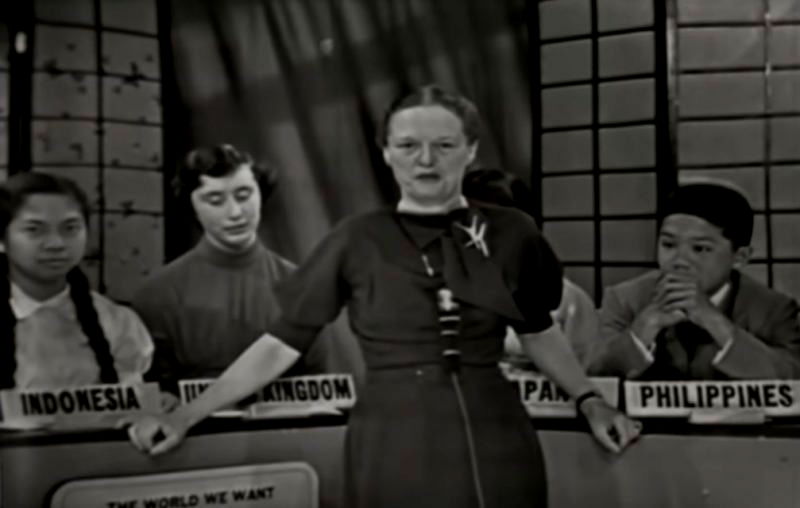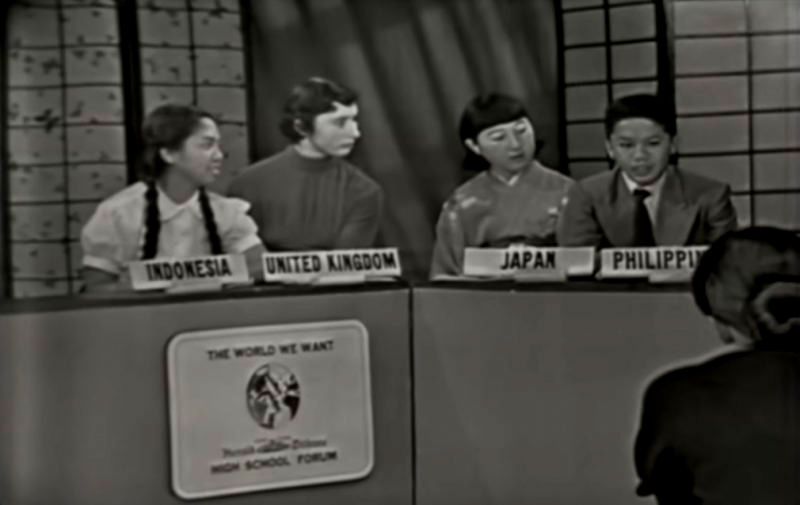This young Filipino speaker from the 1950s has a timeless message on prejudice



By Carl Samson
As Asian Americans continue to grapple with increasing hate during the course of the COVID-19 pandemic, a Filipino teen’s message from the mid-1950s makes a crucial reminder of the problem of prejudice.
“How in the world could you have liberty and justice for all?” asked 15-year-old Raul Contreras, challenging the truth in America’s pledge of allegiance.
Contreras, who pursued a career in public relations, posed the question as the Philippines’ representative in a 1956 episode of “The World We Want.” Produced by WOR-TV and the New York Herald Tribune, the series brought high school students from all over the world to discuss global affairs and social issues.
Contreras’ eloquence is immortalized in the episode uploaded to YouTube by a channel called ArchiveMC in March. The video has since gone viral with over 3.6 million views, and many have praised young Raul for his timeless message.

Wounds of war
In the video, Contreras sits down with three delegates from Indonesia (Ratnati Iskandar Dinata), Japan (Yoriko Konishi) and the United Kingdom (Judith Reader) to discuss prejudice. The forum begins with host Helen Hiett Waller asking each of them to share prejudices of their own.
“Being brutally frank, I am prejudiced against [the] Japanese,” Contreras says while throwing a glance at Konishi, who sits next to him. “Not to the extent that I hate them, but I got this as a result of World War II.”
Imperial Japan committed severe atrocities in the Philippines. Thousands of Filipinos died under its occupation, which officials justified as part of an attempt to unite all Asian nations against Western influence.
While Contreras is upfront about his prejudice, he also demonstrates empathy in acknowledging that post-war Japan was not ready to pay reparations at the time. “Most of them even have to suffer the cold in the classrooms, because they can’t afford to heat the schools,” he says.

On skin color and segregation
The forum continued to touch on other prejudices prevalent at the time. Soon enough, Contreras questions whether skin color is the most common cause of prejudice, leading to a discussion of America’s segregation problem.
“I guess taking the American side of it, it’s just that white people don’t want to mix themselves up with the colored ones,” he says. “From what I’ve seen here, and what I’ve read while I’m here, and what I’ve read in the newspapers, it’s worse than I expected.”
Indonesian speaker Dinata shares that she had spoken to some African American girls who could not visit certain restaurants or clubs. She points out that as long as segregation exists, the U.S. cannot be a pure democracy.
To this, Contreras refers to America’s own pledge of allegiance and its phrase “liberty and justice for all,” which he simply found inexistent.
“Well the last phrase just doesn’t suit everything,” he says. “With this segregation problem here and the discrimination against colored people, how in the world could you have liberty and justice for all?”
Needless to say, Contreras’ arguments continue to resonate especially today, as Asian Americans have been blamed for causing the pandemic.

A life of achievement
Contreras’ daughter, Kate, said she was shocked that the video even existed. In an interview with GMA News Online, she confirmed that her father was indeed an eloquent speaker and shared more details about his life.
Kate said her father graduated magna cum laude from San Beda College — now San Beda University — in the Philippines with a degree in journalism and political science. He later flew to New York to work in advertising.
Contreras eventually established his own company, Public Communications Associates Inc. Former President of the Philippines Corazon Aquino also appointed him as media bureau director.
Still, Kate believes that her father’s greatest achievement was being a doting grandfather. “He would drop everything when it came to family, not just our family but for his siblings and friends as well,” she told GMA News.
Contreras’ grandson Anton Miguel also spoke to reporters about his grandfather. He described him as a truly patriotic man.
“He loved his country more than anything as evident in the video. His patriotism was something that never left him even during his final years,” Anton Miguel told reportr.
Contreras passed away in 2012 at the age of 72. He died of kidney failure from lupus.
Watch the full forum discussion on “The Roots of Prejudice” below:
Featured Image via ArchiveMC
Share this Article
Share this Article